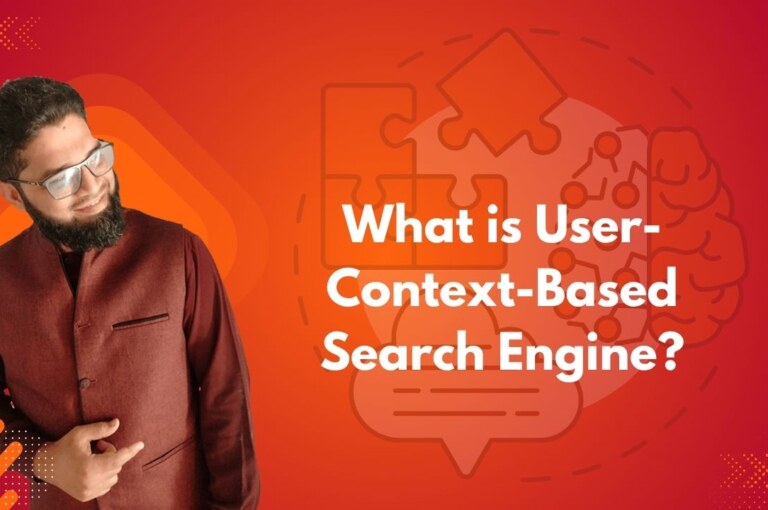A user-context-based search engine is an advanced information-retrieval system that interprets both semantic and behavioral context before ranking results.
Unlike traditional keyword engines that rely on lexical matching, this model analyzes how meaning changes across situations, sessions, and users.
It fuses three contextual layers:
Query context – the linguistic meaning of a phrase in its surrounding words.
Document context – how indexed content expresses related entities and relationships.
User context – personal, temporal, and situational data such as device, history, or intent.
By combining these layers, the system aligns search output with real-world meaning—delivering results that feel conversational, adaptive, and intent-aware.
The Evolution from Keyword to Contextual Search
Search engines originally relied on lexical relevance, using systems like TF-IDF and BM25.
Semantic search then introduced semantic similarity and entity graphs to connect related meanings.
Now, user-context-based search extends this logic further—bridging semantic meaning with personal intent.
Modern systems integrate:
Vector databases for contextual embeddings.
Knowledge graphs for entity relationships.
Session analytics to capture evolving intent.
Privacy-aware personalization layers to balance relevance with user control.
This evolution mirrors Google’s shift toward experience-based ranking under E-E-A-T, combining trust, context, and adaptability rather than pure link metrics or keyword density.
Defining User Context in Search
User context represents every variable that influences meaning from the user’s side.
It includes:
Linguistic context – word order, co-occurrence, and word adjacency.
Session behavior – recent clicks, dwell time, and engagement.
Situational context – location, time, device, and search environment.
Profile data – long-term interest or entity affinity.
Together, these signals help the engine interpret what a user wants and why—forming a context vector that dynamically shapes query understanding and ranking.
Within semantic SEO, this means optimizing not just for keywords but for contextual flow and entity salience so that your content aligns with user behavior patterns in search.
Architecture of a User-Context-Based Search Engine
A modern contextual engine follows a five-stage semantic pipeline:
1. Query Understanding and Disambiguation
The system begins with linguistic parsing, leveraging transformers like BERT or GPT to detect multi-word expressions and ambiguous terms.
Techniques such as query rewriting and canonical intent mapping transform raw input into semantically normalized representations.
Example:
“Apple store near me” → commerce intent, company entity.
“Apple tree pruning tips” → agricultural intent, botany entity.
2. Context Extraction and Embedding
Using contextual embeddings, the engine captures semantic proximity between words, entities, and documents.
It measures semantic relevance through vector distances, ensuring that results represent meaning rather than surface similarity.
3. User Profiling and Session Modeling
Behavioral data from previous sessions, location signals, and device types are aggregated into a user context graph.
This allows adaptive weighting—if a user repeatedly interacts with technology topics, the system will elevate tech-related meanings of ambiguous terms like “Apple” or “Java.”
4. Hybrid Retrieval and Re-Ranking
Engines employ hybrid retrieval—combining sparse lexical models (e.g., BM25) with dense semantic retrievers like DPR or dual-encoders.
After initial retrieval, a re-ranking model refines top results using contextual coherence and engagement metrics.
Related concept: Dense vs. Sparse Retrieval Models.
5. Personalization and Feedback Loop
Relevance feedback closes the loop. Click models and dwell-time analysis measure satisfaction, feeding signals back into the learning-to-rank algorithm.
These feedback systems improve personalization over time while maintaining generalization through anonymized embeddings.
This cyclical pipeline ensures that meaning adapts as the user, topic, and environment evolve.
The Semantic Mechanics Behind Context Comprehension
At its core, a user-context-based engine functions like a semantic brain, constantly mapping entities, roles, and relationships.
It leverages:
Distributional semantics to compute meaning based on context usage.
Knowledge-graph embeddings to connect structured entity data.
Sequence modeling to preserve word order and dependency relationships.
Sliding-window techniques to maintain coherence across long contexts.
These mechanisms collectively transform search into an understanding system—one that predicts intent and sentiment rather than merely matching strings.
Example of Contextual Resolution in Action
Imagine two users enter the same query: “Best Java courses.”
User A recently searched for “backend development frameworks.”
User B browsed “Indonesian travel guides.”
Through session-based signals, the engine resolves that:
For User A → “Java” refers to a programming language, ranking Udemy or Coursera results.
For User B → “Java” means the Indonesian island, showing language schools or cultural programs.
This resolution exemplifies contextual disambiguation—the backbone of modern semantic search.
Why User Context Matters for Semantic SEO
Search engines increasingly interpret meaning at the entity and intent level.
For content creators, aligning with user context means optimizing beyond keywords. You must embed entity relationships and maintain contextual coverage across subtopics.
Practical implications:
Create articles that form part of a cohesive semantic content network.
Maintain topical consistency using topical maps to guide contextual signals.
Monitor your update score to keep context freshness and maintain search-engine trust.
By embedding these layers, you communicate not only what your content says but why it matters in the evolving semantic ecosystem.
Advantages of User-Context-Based Search Engines
Modern search systems powered by contextual understanding dramatically outperform keyword-based models by bridging linguistic and behavioral semantics.
1. Precision and Semantic Depth
By integrating semantic similarity with context vectors, these engines reduce ambiguity and boost result relevance. They recognize how meaning shifts across domains — a crucial leap beyond static indexing.
Through entity-driven ranking and query optimization, the system retrieves content that truly matches user intent instead of mere keyword overlap.
2. Personalized and Adaptive Experiences
Using contextual profiling and click-behavior modeling, results evolve in real time. Whether you are researching linguistics or shopping locally, the ranking stack adapts to your preferences without forcing re-queries.
3. Multimodal and Conversational Context
Voice, image, and text inputs converge. Engines like Google’s Search Generative Experience use sequence modeling and dialogue history to interpret meaning across turns — connecting naturally to conversational search frameworks.
4. Knowledge-Driven Trust
Because retrieval is grounded in entities and facts, these systems align with Google’s Knowledge-Based Trust principles. Accurate entity mapping reinforces credibility and improves visibility for authoritative publishers.
Limitations and Ethical Considerations
Context-driven intelligence introduces new challenges that SEO professionals must understand.
• Privacy and Data Sensitivity
User profiling raises transparency issues. While context boosts relevance, it also stores behavioral fingerprints. Upcoming regulations require clearer consent frameworks and anonymized embeddings.
• Filter-Bubble Effect
Over-personalization narrows exposure to new perspectives. Engines now experiment with context diversity metrics, balancing relevance with informational variety — conceptually similar to Google’s Query Deserves Diversity (QDD) principle in semantic evaluation.
• Context Drift and Cold Start
When user sessions are short or new, engines lack historical context. Systems rely on macro-context (domain-level trends) and fallback semantic matching to maintain relevance.
• Computational Cost
Running real-time embeddings and contextual re-ranking increases infrastructure demand, similar to scaling large-parameter LLMs for passage ranking. Efficient pipelines use hybrid indexing to offset latency.
Applications Across Digital Ecosystems
User-context-based models underpin nearly every modern retrieval experience.
• Web & Enterprise Search
Corporate knowledge bases integrate contextual NLP to enhance internal document discovery. Combined with vector databases, they surface semantically aligned insights rather than literal text matches.
• Voice & Conversational AI
Systems like Siri, Alexa, and ChatGPT leverage contextual flow and entity tracking for multi-turn coherence. Context retention across dialogues prevents intent fragmentation.
• E-Commerce & Recommendation Engines
Context modeling personalizes catalog visibility — ranking products by real-time engagement signals and entity co-occurrence.
• Local & Multilingual Search
When paired with Local SEO, contextual systems interpret geo-intent, micro-moment behaviors, and language nuances to enhance relevance for nearby results.
Implications for SEO and Content Strategy
Semantic SEO now means aligning your publishing ecosystem with user context, not just topic coverage.
1. Optimize for Contextual Relevance
Structure pages around entities and scenarios that reflect user situations. Interlink semantically related resources within your semantic content network to strengthen meaning paths.
2. Build Contextual Bridges
Use transitional language and contextual bridges to connect adjacent topics naturally. This preserves logical flow and improves crawl comprehension.
3. Maintain Freshness and Trust
Monitor your update score to signal timeliness. Search engines favor entities demonstrating consistent topical upkeep — a key trust vector in E-E-A-T evaluation.
4. Design for Dynamic Intent
Map query breadth and intent hierarchies. Broader queries require semantic clustering; narrower ones benefit from deep contextual answers framed through structured data and entity attributes.
5. Measure Contextual Impact
Evaluate changes with metrics like nDCG and MRR (see Evaluation Metrics for IR). Track how contextual optimization improves satisfaction signals over time.
Future Outlook: LLMs and Contextual Intelligence
By 2025, Large Language Models (LLMs) have become the cognitive layer of search. They integrate:
Session-aware embeddings that track user journeys across tasks.
Knowledge-augmented context stores combining Wikipedia & Wikidata.
Reinforcement learning from implicit feedback to fine-tune personalization.
Next-generation engines will balance personalization with user agency — allowing people to toggle contextual layers while maintaining relevance and privacy.
For SEO professionals, the frontier lies in entity-centric optimization and contextual coverage modeling, ensuring that each node in your site’s network contributes to collective topical authority.
Frequently Asked Questions (FAQs)
How does user context differ from personalization?
Personalization tailors results to an individual’s history, while user context interprets the situational meaning of each search. Context can shift even within a single session, requiring adaptive semantic mapping.
Is a user-context-based engine the same as semantic search?
They overlap but differ in scope. Semantic search focuses on meaning relationships within language; user-context-based search adds behavioral, temporal, and environmental variables for deeper intent modeling.
How can websites prepare for context-aware ranking?
Implement entity markup via Schema .org, strengthen internal linking with topical maps, and maintain content freshness guided by update-score tracking.
What are the privacy implications?
Context engines collect behavioral data, but anonymized embeddings and opt-out controls (as seen in 2024–25 Google updates) are mitigating concerns by separating identity from context vectors.
Can context improve voice and conversational search?
Yes — contextual memory enables voice assistants to retain previous turns, bridging gaps across queries through contextual flow.
Final Thoughts on User-Context-Based Search Engines
User-context-based search marks the semantic web’s next frontier — where engines interpret meaning in motion.
By integrating linguistic semantics, behavioral analytics, and entity intelligence, they deliver not just answers but understanding.
For brands and content creators, the path forward lies in contextual optimization — building ecosystems that learn, adapt, and converse with users in real time.
Want to Go Deeper into SEO?
Explore more from my SEO knowledge base:
▪️ SEO & Content Marketing Hub — Learn how content builds authority and visibility
▪️ Search Engine Semantics Hub — A resource on entities, meaning, and search intent
▪️ Join My SEO Academy — Step-by-step guidance for beginners to advanced learners
Whether you’re learning, growing, or scaling, you’ll find everything you need to build real SEO skills.
Feeling stuck with your SEO strategy?
If you’re unclear on next steps, I’m offering a free one-on-one audit session to help and let’s get you moving forward.





Leave a comment